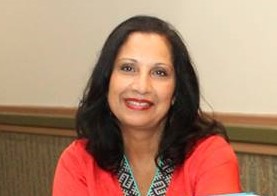Conflict is like lightning. It strikes suddenly and briefly and lights up the dark, making hidden things visible. In human relationships, it casts a light on the deeper reality of the relationship(s) giving us an opportunity to reflect more seriously and perhaps change things. Conflict looks and feels terrible. And yet, it is a huge gift because it forces us to face hidden truths that there was no awareness of or that were being wiflfully ignored.
When I look at my trajectory of development, I realize that as a child, I always ran away from it, and felt like my heart was sinking when there was conflict. I would try to patch things up and nudge everyone to forgo and forget, so things could go back their normal happy state. As I grew up, I developed a strong sense of detecting conflict, even if it was unspoken, which helped me in my corporate career. It certainly moved me away from my first career in information technology and programming to the world of organizational development. As an OD director, part of my role was to help teams and groups work through their conflicts and find solutions. And these days, I run a monthly dialogue practitioner community of practice where we share and learn from each other about how to build peace and reduce conflict.
Some of my lessons learned from conflict are:
- Conflict is just the tip of the iceberg
The first thing we realize is that the triggering event for the conflict is not even the deeper issue. It was just the match that lit the fire on a dried up stack of hay waiting to burn. Things were building up and everyone was ignoring them and then boom, one incident causes everyone to stop and think and talk, preferably in that order.
2. Increased self-knowledge
The thinking part is the most important, as reflection helps us shed layers of self-deception and learn more about ourselves. We are forced to ask questions like: what are my values? What are my principles? What are my boundaries? Was I honoring them or not?
3. Shared Values and Commitments
The next question is: was the other party aware of these or not? Did I even make these visible or explicit? Not that we go around with contract statements before we enter into a relationship and say “Sign here”; but as we spend time together, we do and we should share our deepest held values and commitments. In healthy relationships, we share these and often hold common values and commitments. They bond us and animate our relationships.
4. Healing that Deepens
The most exciting lesson is that the healing that follows once a conflict is surfaced and people can actually talk “rational to rational” and “emotional to emotional” as Simon Sinek puts it, the healing process itself can take the relationship to the next level of trust and transparency.
In group or organizational settings, the rational discussion includes unearthing the systems and procedures that exist. Are they clear? Are they agreed upon? Are they followed? And so on. Often that can take the emotional personal nature of conflict into the different domain of working collaboratively and solving the problems together without blame or distrust.

Be First to Comment